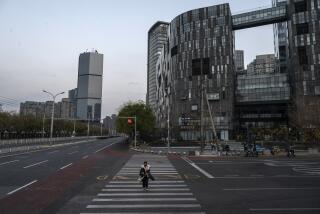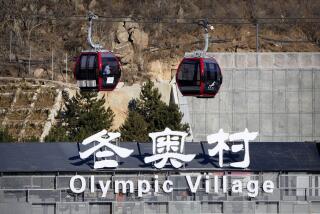Resettlement Opens Doors in China : Lifestyle: The government promises cave-dwellers a better way of living. Some of them have made great strides from poverty to prosperity.
- Share via
FIVE HILLS VILLAGE, China — Ma Zhongbao was skeptical when the government promised a better life if he left his cave home in the arid hills for a new village being built near a river.
Ma had spent all his 58 years in the north China hill town of Yaoshan, as had seven generations of his family before him. He knew everyone in the hamlet’s other caves, feared being bullied by strangers in the new village and was convinced his crops would fail.
“The truck was at the door to move the furniture and I still didn’t really want to leave,” he said, “but the old folks said, ‘Go! Move!’ ”
Five years later, he has a small business that makes annual profits of up to $765, more than even most city dwellers earn. He has an eight-room house and is thinking of buying a car.
He was one of the first in the old village of 315 people to join a resettlement project intended to make life better for China’s poorest.
In all, the government is moving 900,000 people from the mountains and deserts of the Ningxia Hui Autonomous Region and neighboring Gansu province to irrigated land close to the Yellow River. Ningxia is 560 miles west of Beijing.
The resettlement project, begun in 1983 and scheduled for completion by the end of this decade, is China’s largest organized migration in four decades of communist rule. It has cost more than $13 million annually and 320,000 people have been moved.
Many of those relocated are members of Muslim minority groups, who traditionally have been among China’s poorest people.
Peasant families live in the same villages for generations, and persuading them to move is not easy.
The economic inducements are considerable. The government gives each family several acres of fertile farmland, the equivalent of $20 to $150 and a five-year exemption from taxes on harvests.
Success stories such as Ma’s help persuade holdouts.
He moved only 30 miles to Five Hills from Yaoshan, also in Tongxin County, but took a great stride from poverty to prosperity. In the old village, he was below China’s official poverty line--annual incomes of less than $38--as were 40% of the county’s residents.
Yaoshan, now nearly a ghost town, is little more than a cluster of cave dwellings dug into a mountainside, with farm plots on the slopes.
In winter, the entire landscape is the color of the yellow earth and even the sky has a yellow tinge when fierce gusts of wind whip up the powder-dry soil.
Candles are the only source of light in the dark, mud-plastered caves. Coal and grass provide fuel for cooking and a few cisterns trap summer rainwater for drinking.
Ma’s father, Ma Shangao, 83, is one of the few people left in Yaoshan and looks forward to following his children. When asked if he was not reluctant to leave the village of his ancestors, he said: “What’s to be sad about leaving?”
About 30,000 people in Tongxin County have been moved and local officials said a similar number are waiting their turns. Resettlement is in shifts, with the poorest going first.
For decades, the central government pumped millions of dollars of subsidies into Tongxin without addressing the basic problem, lack of water.
Many residents interviewed said they “depended on the heavens for food.” If rain came, they had a meager harvest of wheat, potatoes and radishes. If it did not, nothing grew.
An extensive irrigation system using water from the Yellow River, installed in the last eight years with United Nations’ aid, has transformed about 200,000 acres of lowland into fertile farms.
Mountain villages are beyond the irrigation network’s reach, so their people are being moved to the water.
Ma Zhongbao said he had been certain the land at Five Hills Village would be worse than his mountain plots. Instead, it yielded up to 14 times more.
Some early movers, including Ma, have built homes of brick and stone with glass windows, but others live in tiny, one-room mud huts. Rows of trees and neat mud walls separate the family compounds and fields adjoining the new village are crisscrossed with irrigation ditches.
Few people in Five Hills Village have made as much money as Ma, but most have storerooms full of grain for the first time in their lives.
More to Read
Sign up for Essential California
The most important California stories and recommendations in your inbox every morning.
You may occasionally receive promotional content from the Los Angeles Times.













